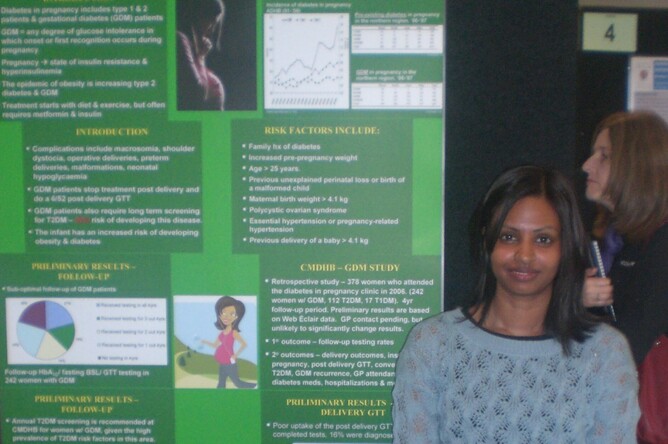Presentation at NZSSD of preliminary findings titled "A RETROSPECTIVE COHORT STUDY OF PATIENTS WITH DIABETES IN PREGNANCY, INVESTIGATING DELIVERY OUTCOMES AND FOLLOW UP".
Sasini Wijayaratna, presented material from a study currently underway looking to evaluate the management and follow up of a group of women with diabetes in pregnancy in CMDHB. The aims were to identify then review progress of clinic attendees during 2006, examine delivery complications, and evaluate follow-up received over 4 years.
Results at this stage were reported as "HbA1c and 6 week GTT data have so far been collected for 109 women with complete data, this is ongoing. 65 patients so-far had GDM and 58% of this subgroup had no post-delivery GTT recorded. 40% have had a new diagnosis of type 2 diabetes post-delivery. Delivery and 4 year followup data is still being compiled"
The conclusion from the early analysis of this initial sample was that it appeared that there were low rates of appropriate follow-up for women with GDM which was a potential cause for concern, particularly in view of the high likelihood of conversion to type 2 diabetes.
More detail in the attached abstract.
A RETROSPECTIVE COHORT STUDY OF PATIENTS WITH DIABETES IN PREGNANCY, INVESTIGATING DELIVERY OUTCOMES AND FOLLOW UP Sasini Wijayaratna 1 , Faye Clark 1 , David Simmons 2 , Brandon Orr-Walker 3 , John Baker 3 . Diabetes Projects Trust 1 , Cambridge University Hospital 2 , Counties Manukau District Health Board 3 . The higher rates of diabetes in pregnancy in the Counties Manukau District Health Board (CMDHB) area is in accordance with increased prevalence of common risk factors. Women who are identified during antenatal screening and referred to the Diabetes in Pregnancy Clinic are a heterogeneous group including diagnosed Gestational Diabetes Mellitus (GDM), type 1 and type 2 diabetes. Treatment aims to decrease complications including macrosomia, shoulder dystocia, and neonatal hypoglycemia. Post-delivery, patients with GDM have their treatment stopped and at 6 weeks undergo a glucose tolerance test (GTT) to ensure GMD resolution. Many perceive this as the end of their disease process, when it fact they have a higher risk of developing type 2 diabetes, a disease that is already rampant in CMDHB. Objective: To evaluate the management and follow up of a group of women with diabetes in pregnancy in CMDHB. Aim: 1) identify then review progress of clinic attendees during 2006, 2) examine delivery complications, 3) evaluate follow-up received over 4 years. Methods: The cohort of 378 was identified using CMDHB database Casemix. The highest HbA1C during pregnancy, 6 week GTT, and yearly HbA1C was obtained from CMDHB results database. Delivery details obtained through Healthware maternity database and NHIS (MOH) databases identify GP attendance, hospitalisations, prescriptions medicines, and mortality. GP contact for missing information. Results: HbA1c and 6 week GTT data have so far been collected for 109 women with complete data, this is ongoing. 65 patients so-far had GDM and 58% of this subgroup had no post-delivery GTT recorded. 40% have had a new diagnosis of type 2 diabetes post-delivery. Delivery and 4 year followup data is still being compiled. Conclusions: From preliminary analysis of this limited sample low rates of appropriate followup for women with GDM are potential cause for concern, particularly with high likelihood of type 2 diabetes conversion.


